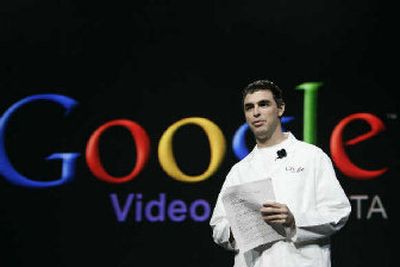Google opens doors to video bazaar

LAS VEGAS — Google Inc. is upping the ante in the online video gold rush, allowing content owners to set their own prices in a bid to create a more flexible alternative to Apple Computer Inc.’s pioneering iTunes store.
Google’s video expansion, announced Friday at the Consumer Electronics Show, already has lined up commitments to sell thousands of downloads, including recent television broadcasts of popular CBS shows and professional basketball games, as well as vintage episodes from series that went off the air decades ago.
“It’s the biggest marketplace of content that was previously offline and is now brought online,” said Jennifer Feikin, director of Google Video.
Since Apple began selling video downloads for its iconic iPod in October, a flurry of companies have joined forces to distribute TV programming or other video content. The company says it currently offers more than 3,000 music videos and 300 television shows for sale.
Google’s flexible pricing model sets its service apart.
Apple dictates all the pricing in its iTunes store, charging $1.99 for each video download and 99 cents for each song downloaded. The restrictions already have caused considerable consternation in the music recording industry and eventually could trigger a backlash on the video side.
With Google’s marketplace, content suppliers can name their own price, from zero on up. The content owners who charge for video downloads must share 30 percent of the revenue with Google.
The video providers have the option of offering content on a download-to-own or download-to-rent basis.
In a sign that content owners will likely pursue different approaches through Google Video, the National Basketball Association will sell broadcasts of its games one day after the event for $3.95. Meanwhile, public television staple Charlie Rose will post his interviews the day after a broadcast, allowing a free streaming for the first 24 hours then making it downloadable afterward for 99 cents each. Meanwhile, CBS is selling episodes of its popular “CSI” and “Survivor” series at the standard iTunes price of $1.99 per download.
Although Google’s service allows content owners more pricing freedom, it isn’t necessarily as liberating for users.
While all of videos downloaded through Apple can be transferred onto a portable player — albeit only its own iPod — for on-the-go viewing, that won’t be true at Google’s service.
Google has developed its own copy protection technology that so far prevents content owners from moving their video downloads to a mobile playing device. In instances where the content provider adopts Google’s copy protection scheme, watching a video sold through Google will require users to be online so they can log on and view it via the company’s video player. CBS and the NBA are among the content owners adopting Google’s copy protections.
However, if a content owner posts unrestricted video on Google, the user could move the video onto pretty much any portable device. Charlie Rose is among those offering unprotected video.
In another distinction from iTunes, Google Video so far works only on Microsoft Corp.’s Windows-based PCs and not yet on Apple’s Macintosh computers.
By relying on its own proprietary copy-protection technology, Google threatens to compound the frustration that some consumers feel when they buy songs from one online source like the iTunes store, only to discover the music can’t be played on an incompatible gadget such as Creative Technologies’ Zen player.
Forrester Research analyst Josh Bernoff offered a possible explanation for Google’s decision: “It’s arrogance.”